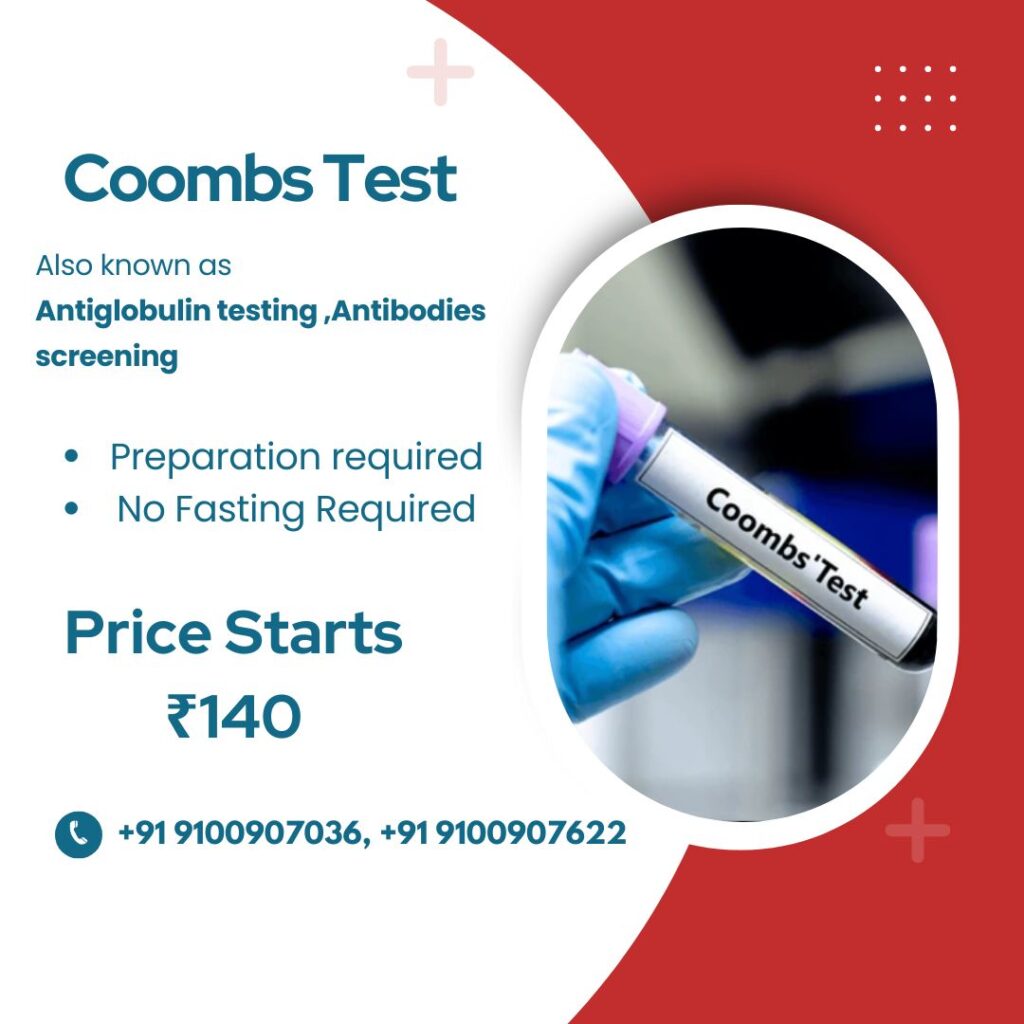Coombs Test in Bangalore
The Coombs test, also known as the antiglobulin test, is a lab test that helps identify antibodies that stick to red blood cells. These antibodies can lead to the immune system attacking and destroying these cells, causing hemolytic anemia.
Purpose: The Coombs test is crucial for diagnosing immune-related disorders where antibodies attack red blood cells, such as autoimmune hemolytic anemia (AIHA).
Types:
Direct Antiglobulin Test (DAT): Detects antibodies already attached to the patient’s red blood cells. It’s used to diagnose autoimmune hemolytic anemia, reactions to blood transfusions, and hemolytic disease in newborns.
Indirect Antiglobulin Test (IAT): Detects antibodies in the patient’s serum (blood component) that can bind to donor red blood cells. It’s important for screening and identifying antibodies, especially in blood banking and compatibility testing..

Fill out form to enquire now
Symptoms
- Abnormal paleness or lack of colour of the skin.
- Yellowish skin, eyes, and mouth (jaundice)
- Dark-colored urine.
- Fever.
- Weakness.
- Dizziness.
- Confusion.
- Can’t handle physical activity.
Coombs Test Price in Bangalore
Price
Coombs Test
Coombs Titre Starting @
₹1900 Rs.750
Coombs Test
Coombs Direct Starting @
₹600 Rs.449
Coombs Test
Coombs Indirect Starting @
₹1600 Rs.499
What conditions require a Coombs test?
- One of the cases is when you fall sick after a blood transfusion. The donor’s blood might not be a match for you. The body attacks and destroys the other blood cells even though they are to help your body and this causes Anaemia symptoms. The destruction of blood cells is at a higher rate than the generation of new blood cells.
- If a newborn child is suffering from jaundice, then most likely a Direct Coombs test is performed to check for any possible foreign antibodies attached to the red blood cells. This could be caused by the incompatibility of blood groups inherited by the newborn from its parents.
- It is done in a pregnant mother or child where the mother has a rhesus-negative blood group and the child has a rhesus-positive blood group. Rhesus protein is a cell membrane protein on the RBC.
- To find out conditions such as autoimmune haemolytic anaemia.
- To avoid complications in the future, seek a Coombs test as soon as you find the mentioned symptoms. A Coombs Test can detect a range of illnesses like haemolytic anaemia, Jaundice, and low red blood cell (RBCS) count.
Other Services At Medintu

9,40,000+
Blood Tests done

Believed By
Doctors

NABL & ICMR
Certified labs

Home Collection
Affordable Home Blood
Procedure for Coombs Test:
- Direct Coombs Test (DCT):
- Blood sample collection.
- Separation and washing of red blood cells.
- Addition of Coombs reagent.
- Observation of agglutination.
- Indirect Coombs Test (ICT):
- Blood sample collection.
- Separation of serum from blood.
- Mixing serum with test red blood cells.
- Incubation of the mixture.
- Washing of red blood cells.
- Addition of Coombs reagent.
- Observation of agglutination.
Key problems that can be determined by doing the Coombs Test
- Autoimmune Hemolytic Anemia (AIHA):
Role: Essential for diagnosing AIHA, where antibodies mistakenly attack RBCs, leading to anemia.
Test Type: Direct Coombs Test (DCT) identifies antibodies bound to RBCs. - Hemolytic Disease of the Newborn (HDN):
Role: Screens for maternal antibodies against fetal RBCs, which can cause severe jaundice and anemia in newborns.
Test Type: Indirect Coombs Test (ICT) detects maternal antibodies in blood serum. - Blood Transfusion Compatibility:
Role: Determines compatibility between donor and recipient blood to prevent transfusion reactions.
Test Type: ICT identifies antibodies in recipient plasma that could react with transfused RBCs. - Evaluation of Drug-Induced Hemolytic Anemia:
Role: Identifies antibodies triggered by drugs that attack RBCs, causing anemia.
Test Type: DCT detects antibodies attached to RBCs. - RBC Autoantibodies in Systemic Lupus Erythematosus (SLE) and Other Autoimmune Diseases:
Role: Detects autoantibodies against RBCs, contributing to anemia in autoimmune conditions.
Test Type: DCT identifies antibodies on the patient’s RBCs. - Detection of Alloimmune Disorders:
Role: Screens for antibodies that develop after exposure to foreign RBC antigens, such as during multiple transfusions or transplants.
Test Type: Both DCT and ICT are used depending on clinical context. - Diagnosis of Paroxysmal Cold Hemoglobinuria (PCH):
Role: Identifies cold-reactive antibodies that cause transient RBC destruction, often triggered by cold exposure.
Test Type: DCT detects IgG antibodies on RBCs. - Evaluation of Hemolytic Anemias of Unknown Origin:
Role: Assists in identifying the underlying cause of hemolytic anemia when other tests are inconclusive.
Test Type: DCT helps confirm autoimmune etiology. - Monitoring Response to Treatment in AIHA and HDN:
Role: Tracks changes in antibody levels and RBC destruction post-treatment.
Test Type: Sequential Coombs tests (DCT and ICT) are used to assess treatment efficacy. - Prevention and Management in Pregnant Women with Rh Incompatibility:
Role: Screens Rh-negative mothers for antibodies against Rh-positive fetal RBCs to prevent HDN.
Test Type: ICT identifies antibodies in maternal serum.
Why Choose Medintu for a Coombs Test?
Medintu offers convenient Coombs testing at home, ensuring comfort and minimal disruption to daily routines. We cater to individuals who value privacy or have mobility issues by eliminating the need to travel to a clinic. Skilled professionals use top-quality equipment and follow strict medical standards to ensure accurate results. Patients receive safe, considerate care with clear pricing and ongoing support. Medintu prioritizes client needs, providing trustworthy, affordable healthcare that is easily accessible. Our ease of use, reliability, and patient-focused approach make Medintu a great choice for at-home diagnostic services. In Bangalore, Medintu offers dependable and accessible diagnostics with expert care and support.
FAQs
What is the purpose of the Coombs test?
- The Coombs test detects antibodies that can destroy red blood cells, crucial for diagnosing conditions like autoimmune hemolytic anemia and ensuring safe transfusions.
Who should get a Coombs test?
- Individuals experiencing anemia symptoms, those with transfusion reactions, pregnant women at risk of Rh incompatibility, and newborns with jaundice or anemia might need the test.
What happens if the Coombs test is positive?
- A positive result prompts further medical discussions and may lead to additional tests, treatments, or management procedures tailored to the condition detected.
Does Coombs test require fasting?
You don’t need to fast before giving your blood sample unless your doctor specifically mentions it for a Coombs test as this does not affect the results in most cases.
Why choose MEDINTU for the Coombs test?
- MEDINTU offers convenience with home sample collection, reliable lab services, and prioritizes patient consultation, ensuring efficient and accessible healthcare solutions in Bangalore.
How do I book a Coombs test with MEDINTU in Bangalore?
- Book via the Medintu website, or customer service for in-clinic or convenient home sample collection.
